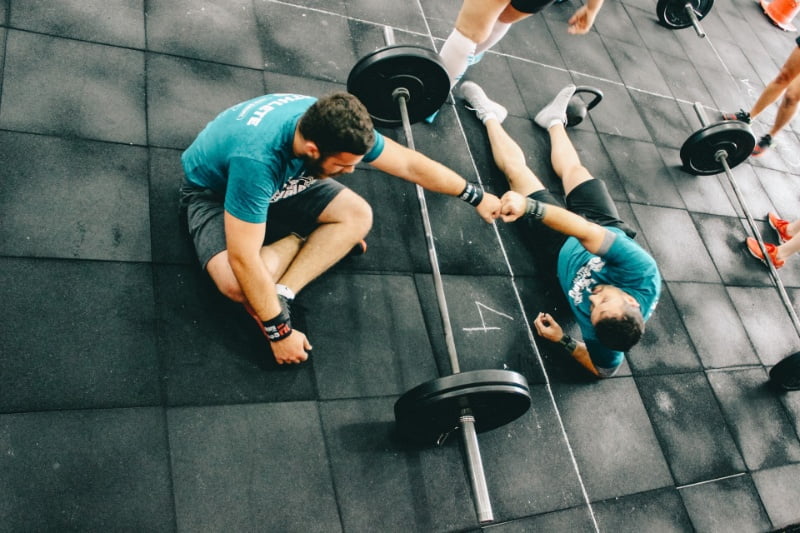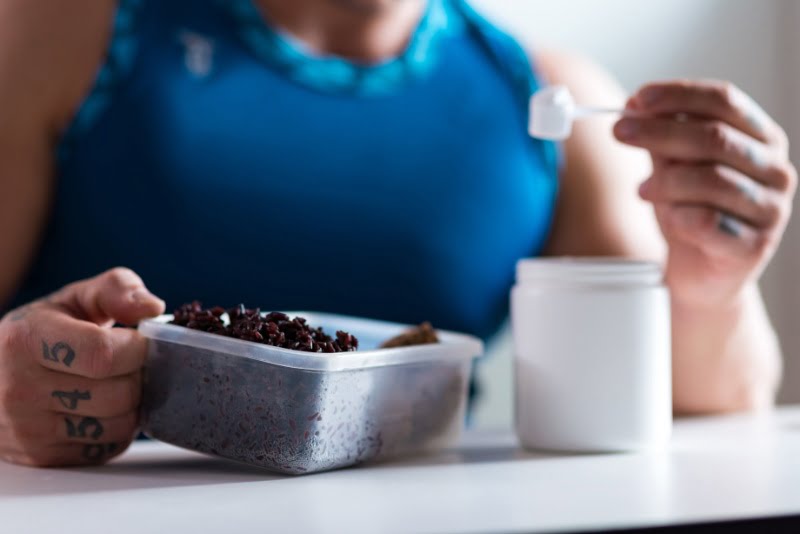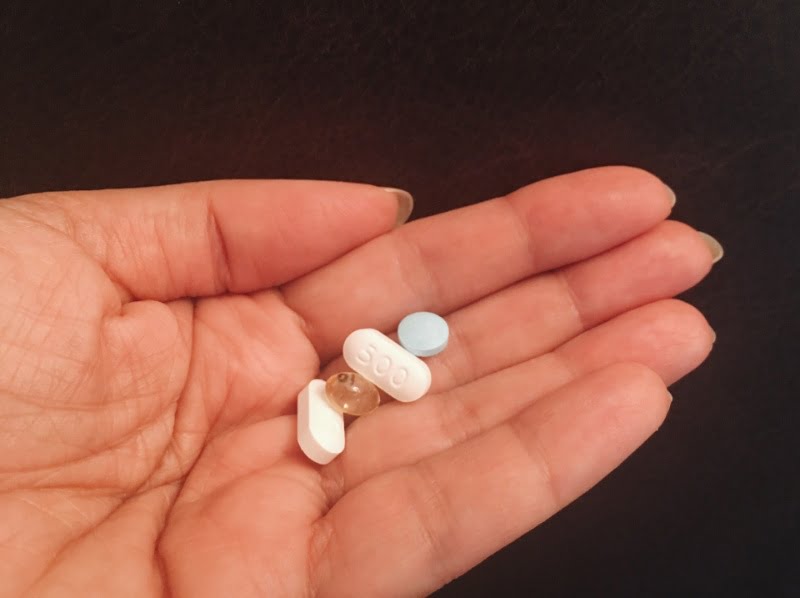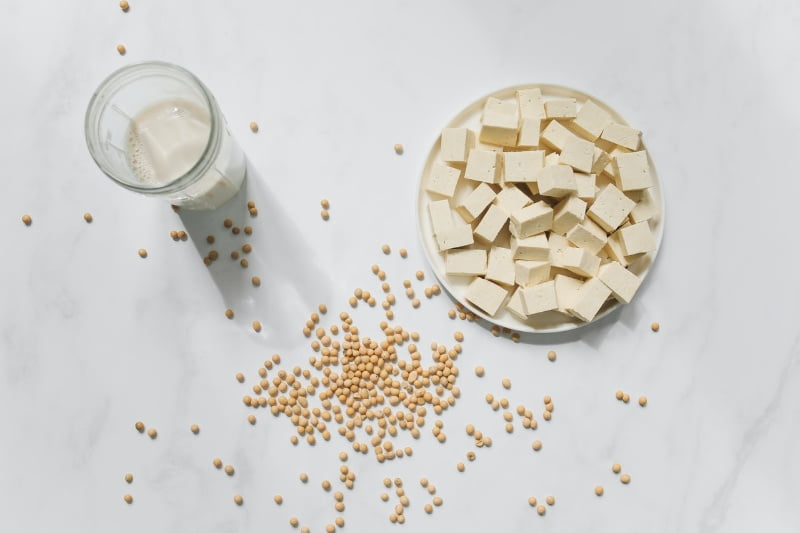Increasing and maintaining your testosterone levels can feel like an uphill battle.
But it doesn't have to be!
There are some healthy lifestyle changes you can make to boost testosterone naturally. In this article, we'll list some of the most effective ways to do so.
8 Evidence-Based Ways to Increase Testosterone Production Naturally
Boost your testosterone with these 8 simple tips:
1. Minimize Cortisol Levels and Stress
On a good day, the stress hormone cortisol helps your body manage its stress response well.
But chronic stress will cause elevated cortisol for long periods of time. This will negatively affect many bodily functions, including testosterone production (1).


Cortisol triggers your body's fight or flight response. If you're under chronic stress, your body is in survival mode.
This means things like a healthy libido and other secondary sexual characteristics will be the least of your body's worries.
Because of this, you should manage your stress to minimize cortisol levels.
Learn to relax! Start a new hobby or reconnect with your old ones. Hang out with your family and friends.
If you let your body calm down, it will realize that it has the energy to make testosterone again.
2. Maintain a Balanced Diet
A healthy diet can do wonders in increasing testosterone levels naturally.


That's because there are foods containing nutrients that the body uses to make testosterone. Some of these include:
Leafy Greens
Leafy green vegetables are rich in magnesium, which increases the amount of free and total testosterone in the body.
In free form, it can bind to more receptors in the body, keeping you in better condition.
Some leafy greens to eat are spinach, kale, and Swiss chard.
Fatty Fish
Fatty fish have omega-3 fatty acids, vitamin D, and zinc — all of which are important to boosting and maintaining your T-levels.
Examples of fatty fish are herring, salmon, and trout.
It's recommended that you eat seafood twice a week. But good-quality fish oil can also work to get your testosterone-friendly nutrients.
Shellfish
Shellfish are packed with the mineral zinc. In fact, oysters have more zinc than other foods.
The mineral is excellent for sperm health and reproductive function in general.
Shellfish also have selenium and omega-3 fatty acids — both of which are great for testosterone.
3. Avoid Drugs and Alcohol Abuse
Substance abuse mostly stops the body from producing luteinizing hormone (LH), which stimulates the body to make testosterone.
A study shows how certain substances affect that production (2):
- Alcohol
- Testicular damage
- Testosterone levels can drop in as fast as 30 minutes after drinking
- High estrogen levels
- Marijuana
- Lower sperm count and concentration
- Raises cortisol levels
- Prevents the secretion of hormones that stimulate testosterone production
- Cocaine
- Lower sperm concentration
- Lower levels of free and total testosterone
- Higher vasoconstriction in the testicles
- Opioids
- Lowers LH levels
- Increases prolactin levels (which hinder testosterone)
- Lower quality of sperm
4. Mix Cardio Workout with Strength Training
Aside from giving you increased muscle mass, every kind of exercise helps you address low testosterone levels.
But full-body workouts are great options — particularly weight lifting and high-intensity interval training (HIIT).


In fact, a study found that doing strength or resistance training three times a week for a month can raise testosterone immediately after exercising (3).
Other quick tips to make the most of your workout are:
- Work your way to heavier weights
- Have shorter rest periods
But it's important to still have a balanced workout plan to improve your overall health. So sneak in some cardio to better circulate the testosterone your body will be producing.
TAKE NOTE: High endurance exercises (like long-distance running) can lower testosterone because they increase cortisol levels.
5. Lose Weight
Fat cells turn testosterone into estrogen.


Additionally, your testosterone level is a mirror of your overall health. So if you aren't at a healthy weight, your brain will tell your body to stop making testosterone.
That's because it believes the body should first fix the problem (a.k.a by losing weight) before it can invest energy in other processes — like producing testosterone.
There are several ways to lose weight:
- Have regular exercise
- Don't starve yourself — doing so just makes your body burn its lean body mass. It will also make you hungrier, causing more weight gain.
- Add whole carbohydrates and protein to your diet.
6. Get Plenty of Sleep
Having just 5 hours of sleep can decrease your testosterone by as much as 15% (4).


Aside from that, poor sleep (or lack of sleep) can increase your appetite, leading to weight gain. And as was mentioned in the previous point, being overweight doesn't do well for your testosterone.
Sleep disorders like sleep apnea affect the quality of sleep too.
If you have a sleeping disorder, you should seek professional medical advice on managing or treating it.
Overall, do NOT stay up for extra hours binge-watching Netflix or scrolling through your phone. Get those 8 hours of good-quality sleep to help you increase your testosterone.
7. Vitamins and Supplements
Certain nutrients can encourage your body to naturally produce testosterone.


- Vitamin D - This steroid hormone can help treat erectile dysfunction (ED). To prevent vitamin D deficiency, increase sun exposure, eat vitamin D-rich foods, or have vitamin D supplementation.
- L-Arginine - This is an amino acid that your body naturally makes! It helps increase blood flow, which can also help manage ED.
- Healthy fats - These are good for balancing your hormones. You can get them from avocados, nuts, and olives.
- Boron - This nutrient lowers estrogen levels, which gives testosterone a chance to increase.
You can get some of these testosterone-friendly nutrients in supplement form. Vitamin D and zinc supplements, in particular, are widely used among those with low testosterone.
There are also natural testosterone boosters that contain formulas of natural testosterone-friendly ingredients. These boosters don't require a doctor's prescription.
8. Stay Away from Soy Products
Soy products (like tofu, edamame, and miso) are high in phytoestrogens.


You might have an idea of what they can do based on the name. But these are substances that have a similar effect to estrogen in the body.
That means having too much soy can affect your hormone levels and lower testosterone.
More research is actually needed in this area since some studies claim phytoestrogens have no effect (5).
But if you really want to play it safe, just don't overdo it with the soy.
What is Testosterone and Why is It So Important?
Testosterone is the primary male sex hormone produced mainly by the adrenal glands.
You could say it's part of what makes a biological man — a biological man.


That's because testosterone is what prompts the body to develop secondary sex characteristics such as body hair and a deeper voice.
Having testosterone deficiency can cause problems such as:
- Fatigue
- Moodiness
- Higher body fat
- Lower lean muscle mass
- Erectile dysfunction
What are the Health Benefits of Testosterone?
Testosterone is mainly known for its role in sexual function, but it has other uses too! Just a few of them include:
- Building lean muscles
- Regulating pain levels
- Helping with weight loss
- Maintaining bone density
- Supporting cognitive ability
- Better cardiovascular health
Are There Any Side Effects?
Normal testosterone levels won't give you any trouble.
But excessively high levels will result in health conditions, such as:
- Headaches
- Stunted growth in younger men
- Mood swings
- Sleep apnea
- Insomnia
- Increased risk of cardiovascular problems
- Sexual dysfunction
- Low sperm count
As you might have noticed, some of the effects of high testosterone are the same as some symptoms of low testosterone levels.
Some studies say that testosterone can trigger prostate cancer. However, there are studies that also say otherwise (6).
What are the Strongest Supplements to Raise Testosterone Levels?
Testosterone booster supplements increase testosterone levels naturally by helping your body produce the hormone.
Here are some of the top-of-the-line supplements:
TestoPrime
This is perhaps the best booster on the market.
It has a potent formula that makes its effects quick and hard-hitting.
With ingredients like vitamin D and B6, zinc, and D-aspartic acid, TestoPrime will improve your overall health.
Pros
- Will work in as fast as one week
- Has a 100% lifetime satisfaction guarantee
- Improves your overall wellbeing
Cons
- A high concentration of ingredients might cause allergic reactions in some users
TestoFuel
TestoFuel is popular among athletes and bodybuilders.
That's because it can help support muscle building and bone strength.
Its blend of ginseng, magnesium, and D-aspartic acid can burn body fat too.
Interestingly, it contains oyster extract as well. This acts as an aphrodisiac that will also increase your libido and sexual function.
Pros
- Helps build muscle and burn body fat
- Results can be seen in two weeks
- The company is transparent about the formula
Cons
- May cause minor side effects
- Not the best option for vegans
TestoGen
TestoGen is perfect for anyone who feels exhausted at the end of the day.
Its formula contains ingredients like nettle leaf and vitamin B6 to increase your T-levels.
This booster supports weight loss and muscle growth too.
Additionally, it improves your recovery time — keeping you energized and focused throughout the day.
Pros
- Improves athletic performance
- Allergen-free
- The company is transparent about the ingredients and individual doses
Cons
- Relatively expensive
- Does not have third-party certification
The Most Effective Way to Boost Free Testosterone
You can actually boost it the same way you increase your testosterone levels as a whole!
But if you want to target free testosterone specifically, you can consume more of certain nutrients. These include vitamin D and zinc.
Aside from foods, you can get them straight from a vitamin D or zinc supplement.
The Most Effective Way to Boost Male Testosterone
Healthy men have healthy testosterone levels. So the best way to boost your levels is to be healthy.


Haven't been going out for a while? You might be at risk of vitamin D deficiency. So spend more time outside or increase your intake of vitamin D-rich foods.
Don't remember the last time you had a breather? The stress might be affecting your testosterone levels. So make some time to relax.
Being mindful of your habits and conscious of your body can help you address low testosterone.
The Best Way to Boost Natural Testosterone
The best way is to boost testosterone naturally!
You can do this by starting testosterone-friendly habits and intaking testosterone supplements to support them.
What is the Safest Way to Boost Testosterone?
The safest way to pull your testosterone up is to go natural.
Apply lifestyle changes (like the ones on the list above!) to encourage natural testosterone production in your body.
Admittedly, this process won't be immediate. But if you diligently follow testosterone-friendly habits, you'll be able to see results sooner rather than later.
The Best Way to Boost Testosterone in Men Over 40
Testosterone decreases naturally with age. In fact, it lowers by 1% yearly after turning 40.
That means that even with your best effort, your testosterone might not increase as much as you like.
But taking testosterone supplements can give you the support you need.
That's because they have formulas that can encourage natural testosterone production.
How to Increase Testosterone Levels in Men Over 50?
Most men DON'T realize they're already running on low testosterone until they hit 50.
But it's never too late to try to get back your normal testosterone levels!


You can consult a doctor, who'll order a blood test to see how low your testosterone has gotten.
Based on the results, they might recommend testosterone therapy to boost your levels.
Aside from following your doctor's recommendations, it won't hurt to make lifestyle changes to help your body produce its own testosterone again.
Frequently Asked Questions (FAQ):
Below are some questions on naturally fixing your testosterone levels:
Can testosterone be boosted naturally and safely?
Yes, testosterone can be boosted naturally and safely. A general way to do it is to make healthy choices. Also, remember that there are limits to how much testosterone is good for you. So make sure you don't boost your levels too much.
Can you boost testosterone with food?
Yes, you can boost your testosterone with food! However, it might take some time since you're encouraging your body to create testosterone — rather than directly adding testosterone into your body.
Conclusion
There are many natural ways to address low testosterone. Among them, the five best ways are:
- Managing stress
- Exercising regularly
- Having a balanced diet
- Avoiding substance abuse
- Getting plenty of good-quality sleep
If you commit to these testosterone-friendly habits, you'll boost your t levels in no time at all!
- Xiong, Xiaofan, et al. “Chronic Stress Inhibits Testosterone Synthesis in Leydig Cells through Mitochondrial Damage via Atp5a1.” Journal of Cellular and Molecular Medicine, vol. 26, no. 2, Dec. 2021, pp. 354–63, https://doi.org/10.1111/jcmm.17085.↩
- Duca, Ylenia et al. “Substance Abuse and Male Hypogonadism.” Journal of clinical medicine vol. 8,5 732. 22 May. 2019, doi:10.3390/jcm8050732↩
- Timón Andrada, Rafael et al. “Variations in urine excretion of steroid hormones after an acute session and after a 4-week programme of strength training.” European journal of applied physiology vol. 99,1 (2007): 65-71. doi:10.1007/s00421-006-0319-1↩
- “Sleep Loss Lowers Testosterone in Healthy Young Men.” Uchicagomedicine.org, UChicago Medicine, 30 May 2011, www.uchicagomedicine.org/forefront/news/sleep-loss-lowers-testosterone-in-healthy-young-men.↩
- Hamilton-Reeves, Jill M et al. “Clinical studies show no effects of soy protein or isoflavones on reproductive hormones in men: results of a meta-analysis.” Fertility and sterility vol. 94,3 (2010): 997-1007. doi:10.1016/j.fertnstert.2009.04.038↩
- Michaud, Jason E et al. “Testosterone and prostate cancer: an evidence-based review of pathogenesis and oncologic risk.” Therapeutic advances in urology vol. 7,6 (2015): 378-87. doi:10.1177/1756287215597633↩
